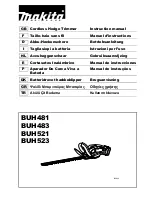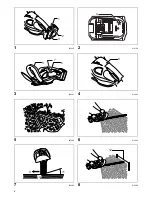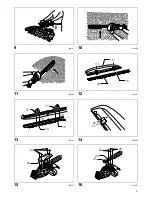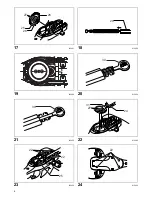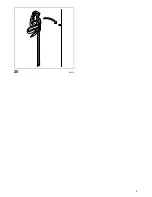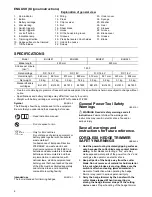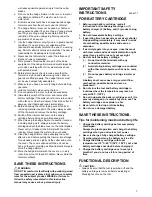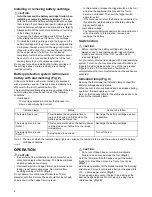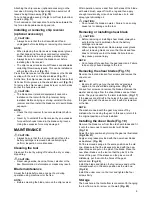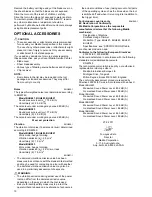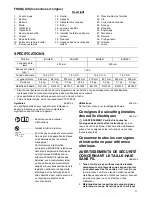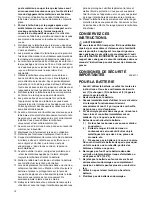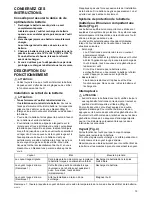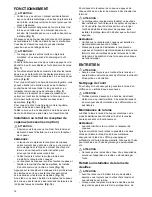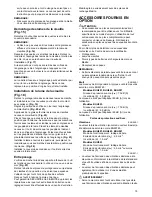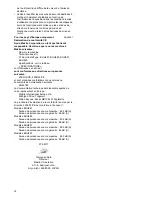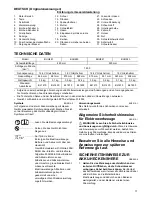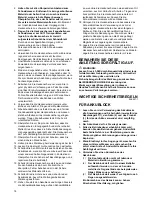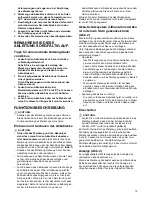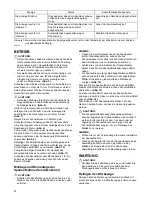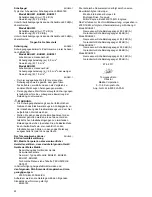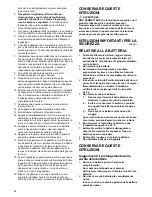
9
Attaching the chip receiver (optional accessory) on the
tool when trimming the hedge straight can avoid cut off
leaves’ being thrown away.
(Fig. 10)
To cut a hedge side evenly, it helps to cut from the bottom
upwards.
(Fig. 11)
Trim boxwood or rhododendron from the base toward the
top for a nice appearance and good job.
Installing or removing chip receiver
(optional accessory)
CAUTION:
• Always be sure that the tool is switched off and
unplugged before installing or removing chip receiver.
NOTE:
• When replacing the chip receiver, always wear gloves
so that hands and face does not directly contact the
blade. Failure to do so may cause personal injury.
• Always be sure to remove the blade cover before
installing the chip receiver.
• The chip receiver receives cut-off leaves and alleviates
collecting thrown-away leaves. This can be installed on
either side of the tool.
(Fig. 12)
Press the chip receiver on the shear blades so that its slits
overlap with the nuts on the shear blades.
(Fig. 13)
At this time, the chip receiver needs to be installed so that
its hooks fit into grooves in the shear blade unit.
(Fig. 14)
To remove the chip receiver, press its lever on both sides
so that the hooks are unlocked.
CAUTION:
• The blade cover (standard equipment) cannot be
installed on the tool with the chip receiver being
installed. Before carrying or storing, uninstall the chip
receiver and then install the blade cover to avoid blade
exposure.
NOTE:
• Check the chip receiver for secure installment before
use.
• Never try to uninstall the chip receiver by an excessive
force with its hooks locked in the blade unit grooves.
Using the excessive force may damage it.
MAINTENANCE
CAUTION:
• Always be sure that the tool is switched off and the
battery cartridge is removed before attempting to
perform inspection or maintenance.
Cleaning the tool
Clean out the tool by wiping off dust with a dry or soap-
dipped rag.
CAUTION:
• Never use gasoline, benzine, thinner, alcohol or the
like. Discoloration, deformation or cracks may result.
Blade maintenance
Smear the blade before and once per hour during
operation using machine oil or the like.
NOTE:
• Before smearing the blade, remove the chip receiver.
After operation, remove dust from both sides of the blade
with wired brush, wipe off it with a rag and then apply
enough low-viscosity oil, such as machine oil etc. and
spray-type lubricating oil.
CAUTION:
• Do not wash the blades in water. Failure to do so may
cause rust or damage on the tool.
Removing or installing shear blade
CAUTION:
• Before removing or installing shear blade, always be
sure that the tool is switched off and the battery
cartridge is removed.
• When replacing the shear blade, always wear gloves
without removing blade cover so that hands and face
does not directly contact the blade. Failure to do so
may cause personal injury.
NOTE:
• Do not wipe off grease from the gear and crank. Failure
to do so may cause damage to the tool.
Removing the shear blades (Fig. 15)
Reverse the tool and loosen four screws and remove the
under cover.
NOTE:
• Be careful not to get your hands dirty as grease is
applied in the shear blade driving area.
(Fig. 16)
Loosen four screws and remove the blades. Remove the
washer and sponge from the shear blades and put them
aside. They are required for the later installation.
(Fig. 17)
If the sleeves are still left in the holes of the gear, remove
the gear and push the sleeves out of it with a screwdriver
or the like.
NOTE:
The washer underneath the gear may come off by
mistake when removing the gear. In this case, return it to
the original position as it was installed.
Installing the shear blade (Fig. 18)
Remove the blade cover from the old shear blades and fit
it onto the new ones to avoid contact with blades.
(Fig. 19)
Adjust the hole positions by turning the gear as illustrated.
(Fig. 20 & 21)
Apply some grease provided with the new shear blades
as illustrated.
(Fig. 22)
Put the removed sponge in the same position as the old
one. Make sure that the sleeves provided with the new
shear blades are put on the pins of the blade. Place the
new shear blades on the tool so that the pins fit in the
holes of the gear. If the sleeves on the pins come off
mistakenly, put them into the holes of the gear
beforehand.
(Fig. 23)
Install the blade and tighten the four screws and put the
removed washer in the same position as the old one.
(Fig. 24)
Install the under cover on the tool and tighten the four
screws firmly.
Storage
The hook hole in the tool bottom is convenient for hanging
the tool from a nail or screw on the wall.
(Fig. 25)

